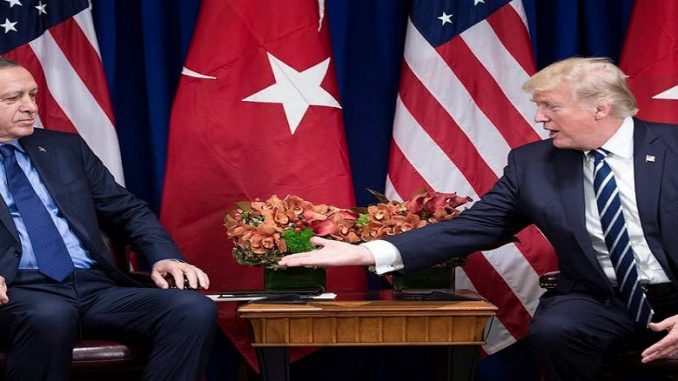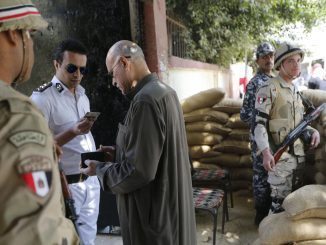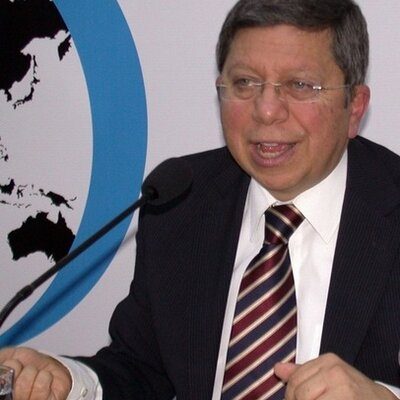
The turbulence in relations with the U.S. may perhaps be viewed as a new difficulty in Turkey’s foreign policy. Hence, the majority see this as a link in the chain of problems that Turkey is recently experiencing in its foreign policy.
By: Yasin Aktay*
The situation in the Middle East since the Arab Spring is as clear as day. Relations that have been strained with the EU’s approach, especially during the July 15, 2016 coup attempt and after it, have added an obvious air of pessimism to Turkey’s process of integration with the EU.
A serious anti-Turkey discourse has formed from the unjust mutterings rising from EU countries, especially in relation to the post-coup process. EU countries’ tear-inducing sensitivity toward the rights of coup plotters and Kurdistan Workers’ Party (PKK) terrorists after the coup, even though they could not think of standing by the Turkish people, who sacrificed their lives to defend their democracy and human rights on the night of the coup, has an increasingly poisonous effect on Turkey-EU relations, from the bottom to the top.
In addition to this, Turkey is trying to sincerely fulfill all the conditions necessary to become a member of the EU. The problem is largely the result of the new issues created when overcoming matters such as Cyprus and fighting terrorism, as well as big states standing audience to the hindrances of states that were later made members of the union.
Turkey is a growing country, a country that wants to grow, that wants to use its sources efficiently and productively in this direction. It would not want to create a problem area with anyone that will suddenly keep it from this path. Turkey has not created this problem area in any of the latest developments itself. The people, democracy, state and leader of Turkey have faced the most organized and sliest coup process in history.
In one aspect, this coup process is Turkey’s own internal problem. When the coup attempt came to be, the countries that chose to watch, seeing this as an internal problem, in other words, the countries that didn’t not think of standing in solidarity with the Turkish people, later made Turkey’s process of settling scores with the coup or coup plotters their own problem and turned the measures Turkey took and tried to take in this regard into a problem area.
The criticisms directed at the state of emergency, the coup plotters being safely sheltered and protected in their own countries, overlooking their anti-Turkey activities in their own countries and the unjust and inconsiderate criticisms directed at Turkey’s democracy in the meantime are the root of these problems.
If we go back to the beginning, one way to interpret our strained relations with the U.S. is to place Turkey at the center of all these problems, but it is also both unjust and incompatible with the truth. The more realistic way is to interpret it is by looking at the U.S.’s latest foreign policy graphics. The picture we get in this case is that there is almost nobody with whom the U.S. has not ruined relations since President Donald Trump took office.
Leaving aside Trump’s trip to the Gulf, which aimed to collect money as if racketeering, all other relations give the image that the U.S. is in a fight with the entire world. As a matter of fact, to what extent he has managed to get the money seemingly pledged is debatable. An approach that brings nothing and covets its own gains alone cannot be sustained and, in the long term, will be good for nothing other than making the U.S. lose. As a result, at best, a goose that lays golden eggs is going to be cut for a one-time monetary gain, and a process during which the U.S. will shrink in the long term and lose in international competition will gain momentum.
The U.S. reviving frozen problems with North Korea and Iran, by taking on Germany, France, the U.K. and all European countries, and without any allies, as well as the oscillating policies with Russia have formed a situation where every country awaits their turn to be attacked by Trump. Looking at it from this aspect, the crisis the Trump-led U.S. has caused with Turkey because of Pastor Andrew Brunson is not an exception.
The trade wars he started with China and Europe and the crisis he has caused now with Turkey are headed toward having an impact that increasingly isolates the U.S. in every area. Frankly, this seems like a process that is going to lead to the U.S. to introvert and turn it into a closed economy.
Trump has formed a significant American patriotic mass with his discourses in the country. As a matter of fact, the most awaited result of these policies may be their impact on the domestic economy. The economic signals in the U.S. do not give as much danger signals as expected in the short term. The 2.2 percent growth that was expected in the first quarter was revised as 2 percent at the end of the year after the 2 percent growth in the first quarter. Nonagricultural recruitment increased by 213,000 people in June, et cetera.
The revival of domestic demand in the introverted economy, decreased export with the impact of the rising dollar prices – while import also decreased – are the reasons behind the indicators being lower than what is feared. All these are signs that the economy will become introverted in the long term. However, nobody can calculate how long the U.S. economy, which is so adjusted to export, can last in this situation.
Meanwhile, the scenarios that await the U.S. in the event the anti-President Recep Tayyip Erdoğan sentiment that is increasingly fueled gives the desired result in the short term are also adequately cautionary. Let us go back to the July 15 coup attempt and continue from there:
God forbid, a Turkey that would fall into chaos at the conclusion of a successful coup would not only fall into chaos itself, it would have caused all of Europe to become chaotic with the migrations and asylum processes that would take place.
The result in Europe would have been the far-right coming to power everywhere. The only country to benefit from this would have been Russia in the region and China in the world. Even though the U.S. supported this coup, its results would have been the start of the end for it. Even this scenario alone should be enough of a warning for the U.S. to mend its ties with Turkey at once. Fixing relations with Turkey means to make peace with the values of its people, its leader and democracy.
*Yasin Aktay is a former member of the Turkish parliament and a leading figure of the ruling Justice and Development (AK Party) in Turkey. (Published in Yeni Şafak Turkish newspaper on 06 August, 2018)



